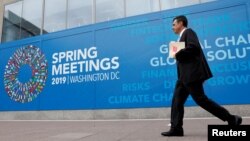The International Monetary Fund is downgrading its outlook for growth in the United States, Europe, Japan and the overall global economy and points to heightened trade tensions as a key reason.
The IMF expects the world economy to grow 3.3 percent this year, down from 3.6 percent in 2018. That would match 2016 for the weakest year since 2009. In its previous forecast in January, the IMF had predicted that international growth would reach 3.5 percent this year.
For the United States, IMF economists downgraded their growth forecast for this year to 2.3 percent from 2.9 percent in 2018.
The IMF's "World Economic Outlook" comes on the eve of meetings in Washington this week of the fund and its sister lending organization, the World Bank.
In Europe, the IMF expects the 19 countries that use the euro currency to expand 1.3 percent collectively in 2019, weaker than last year's 1.8 percent growth or in any year since 2013.
Japan is expected to eke out 1 percent growth this year, up from 0.8% in 2018 but slightly down from the fund's earlier forecast.
The IMF foresees the Chinese economy growing 6.3 percent this year, down from 6.6 percent in 2018. But the fund's latest 2019 outlook was a slight upgrade from the 6.2 percent growth it had forecast for China in January.
China's prospects brightened, the fund said, after President Donald Trump decided to suspend a planned increase in tariffs on $200 billion worth of U.S.-bound Chinese exports.
Still, the fund is expressing worries about tensions between the world's two biggest economies, which have traded tariffs on hundreds of billions of dollars' worth of products in a fight over China's aggressive push to supplant American technological supremacy. The prospect of Britain's messy departure from the European Union also weighs on the global economy.
The IMF expects growth in world trade to drop to 3.4 percent this year — a sharp slowdown from the 4 percent it had expected in January and from 3.8 percent trade growth in 2018.
